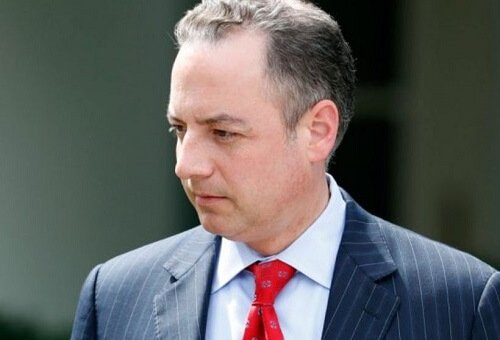In this article, here is the full details of Reince Priebus about wiki, biography, date of birth, birthplace, zodiac sign, nationality, hometown, age, height, weight, father, mother, family, girlfriend, wife, relationship status, children, profession, education, career, net worth, facts, Wikipedia, and many more.

Introduction
Reince Priebus is a prominent American political figure who has played an influential role in Republican Party politics for several decades. Best known for his tenure as the White House Chief of Staff under President Donald Trump, Priebus has had a diverse and storied career in both politics and law. His rise to political prominence involved a mix of strategy, dedication, and a deep understanding of the inner workings of political parties. From his humble beginnings in Wisconsin to his time at the center of political power, Priebus’ life and career offer valuable insights into the dynamics of American politics, the evolution of the Republican Party, and the complexities of modern governance.
This article offers a comprehensive look at the life of Reince Priebus, from his early years to his time as a political strategist, his role as RNC Chair, and his time in the Trump administration. Along the way, we will examine his professional accomplishments, controversies, and the impact he had on American political life.
Early Life and Education
Reince Priebus was born on March 18, 1972, in Dover, New Jersey, to an ethnic Polish family. His father, Richard Priebus, was an accountant, and his mother, Diane (née Henry), was a schoolteacher. The Priebus family moved to Green Bay, Wisconsin, when Reince was young, where he would go on to spend most of his formative years. Growing up in Green Bay, Priebus had a strong work ethic instilled in him by his family, which would later influence his professional career.
Priebus attended Green Bay West High School, where he was involved in various extracurricular activities, including sports and student government. His academic interests leaned toward law, and he was particularly interested in politics and public service. This interest would continue to grow as he pursued higher education.
After high school, Priebus attended the University of Wisconsin-Whitewater, where he earned a Bachelor of Arts degree in English. His undergraduate years were marked by his growing engagement in politics, and he became involved in the campus Republican group. During his time at university, Priebus also developed an interest in the legal field, which would eventually influence his career path. After graduating from college, Priebus went on to pursue a law degree at the University of Miami School of Law. He received his Juris Doctor (JD) in 1998, marking the official start of his legal career.
Priebus’ legal training and background in English would prove to be important as he navigated the political arena. His ability to craft arguments, understand legal documents, and communicate effectively would later help him in various political roles, including his work as a lawyer for the Republican National Committee (RNC) and his time as Chief of Staff at the White House.
Early Political Career
After finishing law school, Priebus returned to Wisconsin and began practicing law at a small firm. However, it wasn’t long before he became involved in politics, focusing on Republican Party efforts in the state. He began working on local and state campaigns, quickly earning a reputation for his political savvy and organizational skills. In 2000, Priebus served as a delegate for George W. Bush during the Republican National Convention, marking the beginning of his deep involvement in national Republican politics.
In 2003, Priebus was elected as the chairman of the Republican Party in Brown County, Wisconsin. His leadership skills were quickly recognized, and in 2004, he became the Wisconsin Republican Party’s general counsel. This position would prove to be pivotal in his career, as it helped him build relationships with key political figures and laid the groundwork for his future roles within the Republican Party.
Priebus’ early political work also involved his service as the co-chair of the Wisconsin Presidential Campaign for George W. Bush in 2004, helping secure Wisconsin’s electoral votes for Bush during the presidential election. This was a critical moment for Priebus as it allowed him to showcase his organizational and campaign management abilities, making him a rising star in the Wisconsin Republican Party.
Rise to National Prominence: Republican National Committee Chairmanship
In 2011, after several years of solid work in state and local politics, Priebus was elected as the Chairman of the Republican National Committee (RNC). This was a pivotal moment in his career, as he went on to serve in the position during one of the most tumultuous periods in American political history.
During his tenure as RNC Chairman, Priebus played a crucial role in guiding the Republican Party through the challenges of the 2012 presidential election. While the party ultimately lost the election to President Barack Obama, Priebus was instrumental in shaping the party’s platform and its outreach efforts, particularly with regard to Hispanic voters. His leadership was focused on modernizing the RNC’s operations and increasing its effectiveness, particularly through the use of digital technologies and data analytics. He also spearheaded a series of reforms within the RNC to help streamline operations and ensure that the party was prepared for future elections.
One of the most significant achievements during Priebus’ time as RNC Chairman was his work on the Republican National Convention of 2012. Priebus managed the convention with great attention to detail and strategic focus, ensuring that the event was as successful as possible given the political environment. Despite the eventual loss of the election to Obama, Priebus’ leadership within the RNC was widely praised, and his reputation as a skilled political strategist continued to grow.
Role in the 2016 Election: Chief Strategist for Trump’s Campaign
As the 2016 presidential election loomed, Priebus found himself at the center of a deeply divided Republican Party. The 2016 election cycle was marked by an unexpected rise in populist sentiment, leading to the unlikely candidacy of businessman Donald Trump. Trump’s campaign, characterized by bold rhetoric and unorthodox policies, was initially viewed as a long shot by many in the Republican establishment. However, Trump quickly gained traction with Republican voters, and by 2016, he had become the party’s presumptive nominee.
In 2016, Priebus was again elected to lead the Republican National Committee, and this time, he found himself tasked with managing the party during one of the most contentious elections in modern history. Priebus worked closely with Trump’s campaign, navigating the internal tensions between the Trump team and the more traditional Republican figures. He became one of Trump’s key allies within the Republican Party, helping to bring unity to a divided GOP and ensuring that the party was fully prepared for the general election.
Priebus’ role as RNC Chairman during the 2016 election was pivotal. He was instrumental in helping to secure the Republican nomination for Trump and was an essential figure in the GOP’s efforts to mobilize voters, raise funds, and improve its outreach efforts. Priebus was often seen as a stabilizing force within the Trump campaign, providing guidance and political expertise at a time when Trump’s unorthodox style was causing upheaval within the party.
White House Chief of Staff: Leadership in the Trump Administration
Following Trump’s victory in the 2016 election, Reince Priebus was appointed as the White House Chief of Staff, taking on one of the most challenging roles in American government. As Chief of Staff, Priebus was responsible for managing the White House staff, coordinating the administration’s legislative agenda, and ensuring that Trump’s vision was translated into concrete policy action.
Priebus’ time as Chief of Staff was marked by both successes and challenges. On the one hand, he helped to streamline operations within the White House, implementing systems to improve efficiency and communication. On the other hand, Priebus faced constant internal battles within the administration, particularly with regard to the influence of rival factions. His efforts to build a cohesive team were often undermined by ongoing tensions between Trump’s inner circle and various advisers.
One of the key moments during Priebus’ tenure as Chief of Staff was his involvement in the initial attempts to repeal the Affordable Care Act (ACA), also known as Obamacare. Priebus was a key figure in the administration’s efforts to push through the Republican healthcare plan, though the effort ultimately failed. This setback was seen by many as a blow to Priebus’ leadership, and his position began to come under increasing scrutiny.
Priebus’ tenure as Chief of Staff was also marked by a revolving door of staff changes. Despite his best efforts to manage the chaos, several high-profile departures within the White House raised questions about his ability to control the administration. Ultimately, Priebus resigned as Chief of Staff in July 2017, replaced by General John Kelly. His departure from the White House was seen as a significant moment in the early years of the Trump administration.
Post-White House Career
After leaving the White House, Reince Priebus continued to be involved in Republican politics, although his role within the party has been less prominent than during his time as RNC Chairman and White House Chief of Staff. He has remained active in political strategy, offering advice to Republican candidates and continuing to serve as a political commentator. Priebus has also focused on his work in the private sector, including his involvement with various corporate boards and legal firms.
Priebus has written and spoken extensively about his time in the White House and his experiences in American politics. His post-political career has been marked by a mix of reflection on the lessons learned from his time in government and a focus on the future of the Republican Party.
Legacy and Impact
Reince Priebus is a figure whose career reflects the changing dynamics of the Republican Party over the past two decades. His early work in Wisconsin and his rise through the ranks of the party helped shape his approach to politics, which emphasized organizational strength, unity, and strategic planning. His leadership of the RNC and his role in the Trump campaign made him a key player in the 2016 election, and his time as Chief of Staff positioned him at the heart of one of the most tumultuous periods in American politics.
While his tenure as White House Chief of Staff was short-lived, Priebus’ impact on the Trump administration and on the Republican Party cannot be overstated. His legacy as a political strategist and party leader remains significant, and his influence continues to be felt in the ongoing evolution of the GOP.
Conclusion
Reince Priebus’ life and career are a testament to the complex and often turbulent world of American politics. From his early days in Wisconsin to his time in the White House, Priebus has played a key role in shaping the direction of the Republican Party. His story is one of resilience, strategic thinking, and the ability to navigate the many challenges of a high-stakes political environment. Whether as RNC Chairman, a key ally to Donald Trump, or as White House Chief of Staff, Priebus has left an indelible mark on the landscape of American politics.
Stay connected with the wikimavani to know more about other trending personalities the wiki, biography, date of birth, birthplace, zodiac sign, nationality, hometown, age, height, weight, father, mother, family, boyfriend, husband, girlfriend, wife, relationship status, children, profession, education, career, net worth, facts, Wikipedia, and many more.









